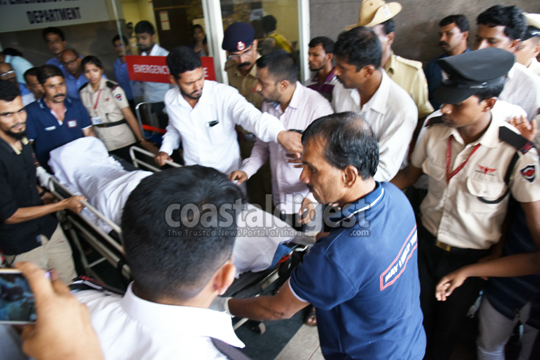Bengaluru, Jun 21: Condemning the brutal killing of one of its activists in Bantwal taluk of Dakshina Kannada district on Wednesday, the Karnataka state unit of the Social Democratic Party of India (SDPI) has urged the government to take necessary steps to book all the accused in the case under Unlawful Activities Prevention Act and immediately release compensation to the kin of the victim.

Ashraf Kalai, SDPI’s Ammunje Zonal Unit President, was killed earlier in the day at Padmunje village in Bantwal taluk hours after he took part in flag-hoisting ceremony on the occasion of the party’s foundation Day. After the party function, Ashraf with other party workers had engaged in filling potholes with stones on Kalayi road, which had become nuisance to the passersby.
In a release issued here, Abdul Majeed, State General Secretary of SDPI, stated that the murder of Ashraf Kalai was a perfectly planned act by the communal goons. “It is to be noted that the Sangh Parivar has been busy plotting to create communal riots during elections and minority festivals which have led to communal tension and several murders. Recently there has been unrest in coastal Karnataka due to communal disharmony,” he said.
“The Karnataka cabinet ministers have openly stated that the RSS leader Kalladka Prabhakar is directly responsible for the riots. Non-arrest and punishment to the seer of hatred Prabhakar Bhat, who has a dozens of criminal cases against him, is the main reason that the coastal region witnesses communal unrest very often,” he added.
Mr Majeed further said that in order to establish permanent peace in the coastal Karnataka, which enjoys a fame for quality of education, health and commerce, Hindu, Muslim and Christians and other communities should join hands and work together continuously. SDPI, along with Police Department and peace loving citizens has been at actively playing its role in creating and maintaining a harmonious atmosphere in the regioin.
He urged the authorities to immediately arrest the killers of Ashraf and slap UAPA against them. “Non-punishment to the goons of Sangh Parivar is the main reason for frequent murders in the region. SDPI appeals to the Chief Minister Siddaramaiah to immediately release a compensation of Rs 30 lakh to the family of the deceased,” he said.




Comments
Mullannu mullindale thegibekonuuuuuuuuu
Add new comment